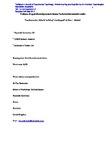Evidence of a Goal-Directed Process in Human Pavlovian-Instrumental Transfer
| dc.contributor.author | Seabrooke, T | |
| dc.contributor.author | Le Pelley, ME | |
| dc.contributor.author | Hogarth, L | |
| dc.contributor.author | Mitchell, Chris | |
| dc.date.accessioned | 2017-09-28T11:05:37Z | |
| dc.date.available | 2017-09-28T11:05:37Z | |
| dc.date.issued | 2017-10 | |
| dc.identifier.issn | 2329-8456 | |
| dc.identifier.issn | 2329-8464 | |
| dc.identifier.uri | http://hdl.handle.net/10026.1/9994 | |
| dc.description.abstract |
© 2017 APA, all rights reserved). Cues that signal rewards can motivate reward-seeking behaviors, even for outcomes that are not currently desired. Three experiments examined this phenomenon, using an outcome-selective Pavlovian-instrumental transfer (PIT) design and an outcome devaluation procedure. In Experiment 1, participants learned to perform one response to earn crisps points and another response to earn popcorn points. One outcome was then devalued by adulterating it to make it taste unpleasant. On test, overall response choice was biased toward the outcome that had not been devalued, indicating goal-directed control. Stimuli that signaled crisps and popcorn also biased instrumental response choice toward their respective outcomes (a PIT effect). Most importantly, the strength of this bias was not influenced by the devaluation manipulation. In contrast, Experiment 2 demonstrated that when stimuli signaled equal probability of the two outcomes, cue-elicited response choice was sensitive to the devaluation manipulation. Experiment 3 confirmed this conclusion by demonstrating a selective avoidance of the cued, devalued outcome. Together, these data support a goal-directed model of PIT in which expected outcome probability and value make independent contributions to response choice. (PsycINFO Database Record | |
| dc.format.extent | 377-387 | |
| dc.format.medium | Print-Electronic | |
| dc.language | en | |
| dc.language.iso | en | |
| dc.publisher | American Psychological Association (APA) | |
| dc.subject | Pavlovian-instrumental transfer | |
| dc.subject | outcome devaluation | |
| dc.subject | goal-directed action | |
| dc.title | Evidence of a Goal-Directed Process in Human Pavlovian-Instrumental Transfer | |
| dc.type | journal-article | |
| dc.type | Journal Article | |
| plymouth.author-url | https://www.webofscience.com/api/gateway?GWVersion=2&SrcApp=PARTNER_APP&SrcAuth=LinksAMR&KeyUT=WOS:000423050000006&DestLinkType=FullRecord&DestApp=ALL_WOS&UsrCustomerID=11bb513d99f797142bcfeffcc58ea008 | |
| plymouth.issue | 4 | |
| plymouth.volume | 43 | |
| plymouth.publication-status | Accepted | |
| plymouth.journal | Journal of Experimental Psychology: Animal Learning and Cognition | |
| dc.identifier.doi | 10.1037/xan0000147 | |
| plymouth.organisational-group | /Plymouth | |
| plymouth.organisational-group | /Plymouth/Faculty of Health | |
| plymouth.organisational-group | /Plymouth/Faculty of Health/School of Psychology | |
| plymouth.organisational-group | /Plymouth/REF 2021 Researchers by UoA | |
| plymouth.organisational-group | /Plymouth/REF 2021 Researchers by UoA/UoA04 Psychology, Psychiatry and Neuroscience | |
| plymouth.organisational-group | /Plymouth/REF 2021 Researchers by UoA/UoA04 Psychology, Psychiatry and Neuroscience/UoA04 REF peer reviewers | |
| plymouth.organisational-group | /Plymouth/Research Groups | |
| plymouth.organisational-group | /Plymouth/Research Groups/Centre for Brain, Cognition and Behaviour (CBCB) | |
| plymouth.organisational-group | /Plymouth/Research Groups/Centre for Brain, Cognition and Behaviour (CBCB)/Cognition | |
| plymouth.organisational-group | /Plymouth/Users by role | |
| plymouth.organisational-group | /Plymouth/Users by role/Academics | |
| dc.publisher.place | United States | |
| dcterms.dateAccepted | 2017-05-24 | |
| dc.identifier.eissn | 2329-8464 | |
| dc.rights.embargoperiod | Not known | |
| rioxxterms.versionofrecord | 10.1037/xan0000147 | |
| rioxxterms.licenseref.uri | http://www.rioxx.net/licenses/all-rights-reserved | |
| rioxxterms.licenseref.startdate | 2017-10 | |
| rioxxterms.type | Journal Article/Review |


